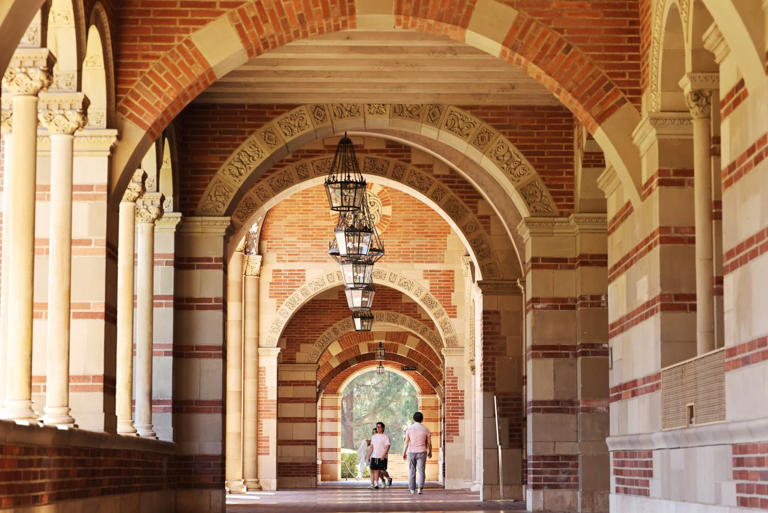
President Trump is ramping up his attacks on public universities.
After months of waging a campaign against private, largely Ivy League institutions, the Trump administration has turned to the University of California, one of the nation’s biggest public-school systems. The move follows recent pressure on other public campuses, including the University of Virginia and George Mason University.
UC President James Milliken, just days into the job, said Wednesday that the university agreed to talks with the Trump administration to resolve allegations that University of California, Los Angeles, fostered antisemitism during campus protests in spring 2024. The Justice Department had given UCLA until Tuesday to come to the table after laying out its initial findings in a letter last week, threatening otherwise to sue.
At risk is $584 million in UCLA’s federal research funds, which the Trump administration suspended following the DOJ letter, Milliken said. The Justice Department said it is still investigating whether any other UC campuses, which include Berkeley, UC Irvine and UC San Diego, violated civil-rights laws.
In Virginia, meanwhile, the leaders of George Mason and the University of Virginia, both public schools, have come under pressure in recent weeks. UVA President James E. Ryan resigned in late June amid tension with the administration.
The Trump administration has notched recent wins in its battle with private universities, extracting a settlement of more than $200 million from Columbia University and a $50 million deal from Brown University. Beyond the money, both deals also require the universities to agree to some additional monitoring of their admissions policies and operations.
The administration has said it is trying to remake higher education, ridding campuses of diversity, equity and inclusion programs and “woke” ideology among faculty and students.
Public universities are generally intertwined with states in deeper ways than private ones, providing opportunities for upward mobility, employment and retirement to hundreds of thousands of workers and an education to a diverse swath of students.
That diversity is part of why UC landed in the hot seat.
The Justice Department said in June that it was opening an investigation into the UC system over possible race- or sex-based discrimination in its employment practices. In doing so, DOJ pointed to a strategic plan that said UC should strive to hire diverse faculty members.
A separate probe launched earlier this year promised to look into admissions practices at Berkeley, UCLA and UC Irvine over allegations of race-based preferences in violation of a 2023 Supreme Court decision. Affirmative action has been banned in California since the 1990s.
The UC negotiations will be among Milliken’s first acts in his job running the 10-campus system, a position he officially took on Aug. 1 after years at the helm of the University of Texas and other public-school systems.
“These cuts do nothing to address antisemitism,” Milliken said Wednesday of the hundreds of suspended grants to UCLA. The loss of the funds, he said, “would be a death knell for innovative work that saves lives, grows our economy and fortifies our national security.”
Some faculty want to see Milliken take a stronger stand against the federal government.
“We have to fight for what we believe in,” said Michael Chwe, a political-science professor at UCLA and board member of the UCLA Faculty Association. “Negotiating with such a malicious, bad-faith actor only legitimizes what they’re asking for.”
Chwe is among 1,600 faculty, staff and students who have signed onto a letter demanding the university take the fight to court and backfill the lost funding through either unrestricted endowment funds or working with the state legislature.
In its letter to UCLA last week, the Justice Department accused UCLA of subjecting Jewish and Israeli students to pervasive harassment during campus protests. UCLA had among the most combative encampments in spring 2024, with a dayslong takeover of the main campus quad outside the library and hundreds of arrests.
The Education Department under the Biden administration previously investigated and resolved discrimination complaints under Title VI of the Civil Rights Act related to the UCLA encampment.
UC, like many universities, has taken steps to address antisemitism and discrimination. At UCLA, that has meant creating a new office of campus safety, revising policies to manage campus protests and disciplining those who violate policies. A UC-wide social-media campaign promises: “Hate has no place here.”
Last week, UCLA also agreed to pay $6.13 million to resolve a civil lawsuit brought by students and a professor related to the pro-Palestinian protests. Some of the money will go toward organizations that support Jewish students.
The University of California educates around 300,000 undergraduate and graduate students on its 10 campuses spread across the state.
UC has said it receives more National Institutes of Health and National Science Foundation funding than any other institution in the country. The system receives almost 6,700 federal grants and contracts totaling $3.85 billion.
The UC system is also affiliated with three national Energy Department laboratories, which develop nuclear energy, among other things.
UCLA leaders spoke to more than 3,100 faculty and staff Monday at a town hall about the research cuts.
Siobhan Braybrook, an associate professor at UCLA, learned her National Science Foundation grant had been suspended when she saw her name on a list circulated late last week by the university. She has since had to redeploy lab staff and pause research on how seedlings emerge from soil, work aimed at helping farmers increase food supply. “Most of us aren’t sitting around just doing things just for fun,” Braybook said. “We want our science to do good things in the world.”
UCLA Chancellor Julio Frenk last week spotlighted the university’s research highlights, including its history in helping create the internet, as well as modern-day work searching for space objects that could threaten Earth and developing lifesaving organ-transplant methods.
This progress comes from “a uniquely American idea,” Frenk wrote in a campus message, “that public research universities, backed by federal support, can move our nation and all of civilization forward.”
Write to Sara Randazzo at sara.randazzo@wsj.com


